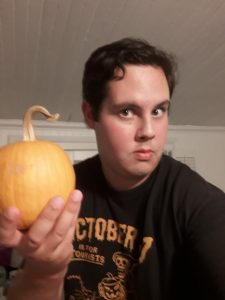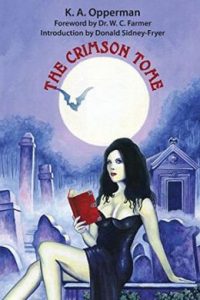This is the English original of the (Hungarian) interview I made with K.A. Opperman for The Black Aether / The Hungarian H.P. Lovecraft  society. Kyle is a poet of dark and macabre inspirations who likes traditional verse, evocative images and collects obscure vocabulary items.
society. Kyle is a poet of dark and macabre inspirations who likes traditional verse, evocative images and collects obscure vocabulary items.
1. Why did you start writing poetry? What do you think poetry can offer to the modern man and how has the role of poetry changed throughout history?
I first began writing poetry as an antidote to the rejections I was getting early on for my fiction. I had been reading some of the poetry that was getting published in online horror magazines, and had the idea that—even though I knew nothing about poetry at the time—I could do better. My earliest attempts were pretty bad…but soon enough, with a few years of intense study and practice, I began to get a hold on the craft. My eventual discovery of Clark Ashton Smith cemented my love of poetry, and my desire to write my own.
Poetry has a lot to offer to anyone with the patience to discover it. For the reader, it offers an escape, a musical atmosphere of enchantment; for the writer, it can be a therapeutic exercise. The reading and writing of poetry was a much more common pastime long before things like television and the internet ever existed, but this great art-form has not vanished, and can still be enjoyed or practiced by anyone with the strange longing in their heart for something more than the ordinary.
2. In his essay „The Verse Libre Epidemic” H. P. Lovecraft dismisses the free verse form. Do you write in free verse or do you prefer traditional forms?
I myself only write in traditional, metered and rhyming verse—which is uncommon in today’s poetry scene. Very early on, I experimented with writing some free verse, and instantly knew it did not suit me. I consider rhyme and meter to be indispensable tools in the poet’s toolbox, tried and true.
3. You write prose and poetry as well. How is a typical K. A. Opperman poem and a typical K. A. Opperman story? Are there returning elements or stylistic traits which allow us to recognise your writing right away?
The truth is, these days, I basically only write poetry, and that is what I am most known for. My poems usually feature a Gothic or rustic atmosphere, and often blend the macabre with the erotic. They are ornate in style, with a strong emphasis on imagery. I try to write in a very classic style that cannot be pinned down to any particular time period, especially not modern times.
4. If I know well, you are interested in fungi and mushrooms. It’s a very interesting hobby could you tell us a bit more about it? How did you come across this idea? Can you use the things you learn for your writing?
I have always loved nature, and have an avid interest in all things that grow, especially if they are strange in some way. I find mushrooms fascinating because of their unusual appearances, ephemeral nature, and the folklore surrounding them. I also have an especial love of pumpkins, partly due to my well-known obsession with Halloween—a holiday that has exploded in popularity in the US. I grow my own pumpkins every year, among other things, and the season-long process has a strong influence on my poetry. In fact, I am currently working on a book entirely of Halloween poems.
5. Your other hobby is also quite Lovecraftian: expanding your vocabulary and finding obscure and obsolete words. What are your three favourite words and why?
That’s a tough question! I don’t really have three top favorite words, but here are three that I like: ‘samhanach,’ a Scottish goblin that only appears on Halloween; ‘cucurbit,’ the scientific name for pumpkins and other gourds; and ‘neep,’ an old word for turnip, the first vegetable used for the original jack-o’-lanterns.
6. In the afterword of Ashley Dioses’s „Diary of a Sorceress” collection I read that you wrote the poem „Sorcerously Entwined” in collaboration. Could you tell us a bit about the writing process? Have you collaborated on other things since then?
Yes, Ashley and I wrote that together during our early correspondence. I would write a few stanzas, then she would write a few, and together, we wove a tale in verse of high sorcery. Ultimately there were three parts to this saga, each longer than the one before. One day we may edit them and publish them as a chapbook—we shall see. We do not collaborate often, but recently, we did collaborate on a poem called The Ocean Queen.
7. In your bio next to your short story published in The Horror Zine you wrote that, alongside Clark Ashton Smith, Lovecraft is your greatest influence. When did this devotion start and what makes him special for you?
As for many writers, Lovecraft was a formative influence on my early efforts at fiction. His ornate style, combined with themes of alien gods and elder monstrosities, resonated with me in a way nothing else had before. Reading his work turned me into a dedicated fan of horror literature, above all other genres, and I owe him a great debt for his influence.
8. Do you prefer Lovecraft’s poetry or prose? If you had to choose a favourite poem and short story, what would these be?
While, technically speaking, Lovecraft was a far better prose writer than poet, I enjoy both. Craft-wise, his poems often fall a little short, but he makes up for this with a powerful and unique imagination. I really could not be without his poems or his stories. I have many favorites, but I can single out the sonnet “Star-Winds” and the story “The Festival” as pieces that particularly bewitch me, calling me to revisit them again and again.
 9. If someone would like to take a plunge into the world of weird poetry, what poets and poems would you recommend? Who are the essential classics and who are the prominent contemporary figures?
9. If someone would like to take a plunge into the world of weird poetry, what poets and poems would you recommend? Who are the essential classics and who are the prominent contemporary figures?
First and foremost, I would recommend reading the poetry of Clark Ashton Smith—possibly the greatest weird poet of all time. His mentor George Sterling wrote some stunning material as well. David Park-Barnitz is an absolute must read for seekers after the macabre. Lovecraft’s weird poetry is essential reading as well. And don’t miss out on Donald Wandrei. As for contemporary weird poets, in no particular order, Ann Schwader, Fred Phillips, Leigh Blackmore, Wade German, Michael Fantina (who sadly passed away earlier this year), Adam Bolivar, Ashley Dioses, and D. L. Myers are all excellent.
10. What was the best advice you got as a writer /poet?
Well, one thing I have been told many times, and the one thing I like to tell other aspiring poets, is to be yourself, no matter what. Write the things you want to write, in the way you want to write them. Don’t write for anyone else; write for YOU. Because then, and only then, will your work be truly unique. Being yourself is your greatest advantage, because no other poet, no matter how talented, can be you, or write the things that come from your own unique heart and soul.
11. If you could have dinner with three writers/poets (dead or alive) who would they be and why?
First, I would choose Clark Ashton Smith. I think I am more fascinated by his work and life in general than I ever have been about any other writer. Second, H. P. Lovecraft, for his passion, poetic soul, and uncanny imagination. Third, I would have dinner with Ashley Dioses, because she is intelligent, beautiful, and a wonderful conversationalist—in fact, I have dinner with her all the time!
Blood and Beauty
O Erzsebet, I offer up my blood
Unto your beauty—life is less to me
Than to behold your hair’s black sheen, and see
Upon your fair white face a deeper rud.
Grant me but this—to glimpse within the pool
Of blood that flows from out my heart’s deep wells,
As in a crimson mirror, all the spells
Of your appearance, beautiful and cruel.
Vér és Szépség
Ó, Erzsébet, érted vérem adnám
Hisz gyarló életemnél is drágább
Látni hajad bomló, sötét fátylát
S viruló pírt Grófnőm halvány arcán.
Kívánságom csak ennyi: egyetlen
pillantás a szívünk véréből nyílott
tükörbe, s hogy áruld el a titkot:
mitől vagy ily gyönyörű s kegyetlen?
Halloween Awaits
Past the glad and sunlit season,
Past the solstice, sunlight’s treason,
When the shadows drown all reason
‘Mid the autumn’s red demesne,
Then the jack-o’-lantern’s laughter
Flames at twilight, ever after—
Then, the woodland witch will craft her
Haunting spells of Halloween.
Halloween közeleg
Vége a víg, forró nyárnak
hanyatló fényű Szent Ivánnak
mindenfelé árnyak járnak
az ősz vöröslő birtokán.
Töklámpás lobban kacagva,
lehull az alkonyat hamva,
s Halloween éjszakán csalfa
bűbájtól zeng az ingovány.
You can find the Hungarian interview here.
If you liked this, you might want to read my interview with Ashley Dioses,who is also a great weird poet, here. For the Hungarian interview click here, for my translations of Ashley’s poetry click here and here.
If you want to buy the Crimson Tome, you can do it here.